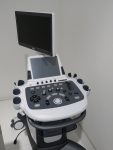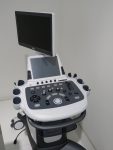
Page Navigation
- What is Required to Be a Sonographer?
- Sonography Job Shadowing
- Advanced Ultrasound Technician Courses
- Pre-professional/Pre-requisite Ultrasound Courses
- Associate’s Degree in Sonography Courses
- Courses for a Bachelor’s of Science in Sonography
- Specializations & Concentration Tracks within Ultrasound
- Continuing Education Requirements
- Points to Consider When Researching a School or Program
- Q: What are the requirements that your school has set for admission into the sonography program?
- Q: Does your school offer various options, such as a degree, and a certificate program?
- Q: Is your sonography program accredited and does it makes me qualified to sit for a national sonography certification exam upon graduation?
- Q: What type of sonography facilities are used as part of the program?
- Q: How many clinical rotations are there and where will they be held?
- Q: Does your school have articulation agreements with other colleges/universities?
- Q: What types of services do you offer students?
- Q: What makes your school’s ultrasound or sonography program stand out?
- Q: What is your career/job placement track record?
- Q: Do you offer online classes?
- Q: If I am not so great at Physics and Science Courses, am I still a good candidate for ultrasound programs?
- Q: What does “clinical” mean as in “clinical training,” “clinical hours” etc.?
What is Required to Be a Sonographer?
When becoming a sonographer, many people just think about finishing the obligatory education and getting a degree.
However, so as to be a competitive candidate for a position in sonography, successful completion of an ultrasound technician program is a must, but there are some other qualifications that you can get, such as certifications and licensure.
So as to make your education research easier, we decided to offer you certain data so that you can understand what types of sonography courses you might be required to take.
An ultrasound technician is more than just a person waving a probe over a patient’s body.
Only those who possess a firm knowledge of biology, physics, technology, health, and patient care can be successful in this field.
As part of a certificate or an ultrasound technician degree program, students will be required to complete rigorous ultrasound courses & programs in each of these subject areas.
Sonography Job Shadowing
When enrolling in some of the most competitive medical imaging degree programs, you may be asked to meet different requirements.
Some will require that applicants complete a certain number of job-shadowing hours and schools include an Observational Hours verification form as part of their application packet.
There are others that require a minimum of 30 observational hours in a Diagnostic Medical Sonography setting.
Our suggestion is to review each school’s requirements prior to applying and get the answers to all the questions, so as to find out if a licensed sonographer career is the right choice for you.
Advanced Ultrasound Technician Courses
There are many people who are already working as sonographers but want to advance in their careers, so they decide to complete advanced ultrasound technician courses.
That way they further specialize and improve their salaries.
Those who are certified through the ARDMS (American Registry for Diagnostic Medical Sonography) are required to complete 30 continuing medical education credits related to the ultrasonography within three years of certification.
You can connect with colleges and universities in your area that offer sonography as well as other medical imaging and allied health programs offered on campus or online.
Pre-professional/Pre-requisite Ultrasound Courses
Core ultrasound classes may be divided into pre-professional (or pre-requisite) courses and those related to the profession of sonography.
You need to know that prerequisites may vary from school to school, but the common courses required to enter the degree program are the following:
- Anatomy and Physiology
- College Algebra
- General Physics
- English Composition
- Biology (Anatomy & Physiology, Microbiology)
- Psychology/Sociology
- Medical Terminology
Associate’s Degree in Sonography Courses
These are the common courses you can expect to take as part of a two-year associate’s degree program:
- Principles of General Sonography
- Ultrasound Physics and Instrumentation
- Abdominal Scanning and Pathology
- Sonography Patient Care
- OB/GYN Scanning and Pathology
- Vascular Scanning
- Superficial and Small Parts Scanning
- Registry Review
- Clinical Internships and Labs
Courses for a Bachelor’s of Science in Sonography
The completion of the advanced courses is necessary to obtain a bachelor’s degree, besides the basic sonography courses.
The courses will most likely include the following:
- Healthcare Ethics
- Introduction to Epidemiology
- Conflict Resolution in Healthcare
- Health Policy
- Ultrasound Physics
- Healthcare and Aging
- Academic and Professional Writing
Specializations & Concentration Tracks within Ultrasound
For those more interested in certain areas of sonography, colleges and universities offer ultrasound degree programs which are designed so as to allow students to specialize or concentrate in a particular area of ultrasound.
This can be achieved through extended coursework and focused clinical rotations and we offer you some examples of common specializations:
- General Ultrasound: Includes abdominal sonography (the liver, spleen, kidneys, gallbladder, and pancreas), obstetric sonography (ultrasounds of a developing embryo/fetus inside the mother’s uterus), and gynecologic sonography (ultrasounds of the female reproductive system).
- Cardiac Ultrasound: Sonography of the heart.
Continuing Education Requirements
In the majority of medical fields, continuing education is necessary.
This is due to the fact that techniques and equipment continue to become more advanced, thus requiring that the workers are skilled to work with them
The demand for sonographers continues to increase, and more and more new sonographers get their degrees, so it is advisable that sonographers continue their ultrasound training even after they have secured employment.
That way they will be sure that they perform the job successfully, that they become more specialized and advance their career and they can expect better salaries.
In order to maintain certification, continuing medical education (CME) courses must be completed and there are numerous institutions and organizations that nowadays offer advanced ultrasound courses that are recognized.
The Society of Diagnostic Medical Sonography (SDMS), the Society for Vascular Ultrasound, the American Society of Radiologic Technologists, and Sonography Canada are just some examples of approved CME providers.
Points to Consider When Researching a School or Program
If you have started your researching of any education program, no matter if that is a certificate, undergraduate or graduate-level courses, it is always a good idea to talk to an advisor from each school you are considering and ask questions so as to make sure you have chosen the perfect educational institution for yourself or your child.
Some of the possible questions to ask a representative when researching a school or program are:
Q: What are the requirements that your school has set for admission into the sonography program?
You will have to bear in mind that eligibility for an ultrasound program will vary by school and degree level.
There are some schools that only require a High School diploma, while there are others that require the completion of a few college courses in areas such as Biology, Physics, Maths, or Medical Terminology.
Plus, some programs enroll students who have already completed two-year allied health or health science program.
Q: Does your school offer various options, such as a degree, and a certificate program?
It is significant that you know all your options so as to be able to determine which program is best for you.
This is determined based on past educational experiences and future career goals.
If you think about gaining a certificate, you should know that they are available only to students who already have at least an associate’s of science degree in another discipline.
Q: Is your sonography program accredited and does it makes me qualified to sit for a national sonography certification exam upon graduation?
Accreditation is the most important thing you need to consider when looking for the sonography program, being that when you complete an ultrasound program accredited through the CAAHEP (Commission on Accreditation of Allied Health Programs) or CMA (Canadian Medical Association), you will become qualified to sit for the national registry certification exam offered by the ARDMS without having to do any extra clinical work after graduation.
Furthermore, employers would always prefer to hire sonographers who have completed an accredited program.
Q: What type of sonography facilities are used as part of the program?
Enrolling in a school that offers advanced equipment will be of great benefit to you as you will need to have quality hands-on experience using up-to-date ultrasound equipment to be qualified as a great sonographer upon graduation.
The better-equipped facilities are, the better you will be prepared for clinical internships and your career.
Q: How many clinical rotations are there and where will they be held?
You would like to complete more than one clinical internship at a real-world facility or you can choose an on-the-job experience that is also a good idea.
You can do it in a hospital or reputable medical center/healthcare facility.
Q: Does your school have articulation agreements with other colleges/universities?
This is very significant as, if the school has formal agreements with other schools, you can transfer credits towards a higher degree, such as transferring credits from an Associate’s degree in Diagnostic Medical Sonography towards a Bachelor’s.
Q: What types of services do you offer students?
This question is related to things such as the availability of academic support/tutoring centers for sonography courses, financial assistance and scholarships, one-on-one academic advising, and extracurricular clubs.
Q: What makes your school’s ultrasound or sonography program stand out?
The representative should speak about the instructors and faculty experience, whether its program won any awards and if there are areas that have been improved.
He/she should mention if there are opportunities for students to concentrate on ultrasound specialties?
Q: What is your career/job placement track record?
Each prospective school has to be able to provide you with accurate data on their graduates’ success rate on securing employment.
It is also beneficial if the school offers career counseling and employment services, like job search and resume writing assistance, recruiting events, employer networking opportunities, interview, and other skill-based workshops and the like, for students and alumni.
Q: Do you offer online classes?
When it comes to a sonography degree or educational program, it is necessary that a part of the ultrasound training takes place in person for hands-on experiences in the lab and clinical internships.
However, some colleges offer hybrid ultrasound programs, particularly at the Bachelors’s and Master’s levels, that offer a combination of theoretical courses online and practical ultrasound classes in person.
Those students who are completing a higher-level degree and have already completed clinical hours as part of a 2-year program can finish all ultrasound courses online.
Q: If I am not so great at Physics and Science Courses, am I still a good candidate for ultrasound programs?
It does not matter if you struggled with sciences in high school, you can still be a successful ultrasound technician.
Even though physics and science classes can be challenging, and they are an important part of an ultrasound program, there are other subjects, such as the physics, biology, and medical courses you will be taking, that will directly pertain to the field of sonography.
Q: What does “clinical” mean as in “clinical training,” “clinical hours” etc.?
Students gain clinical hours by gaining hands-on experience working side-by-side with experienced sonographers and other healthcare or medical professionals.








